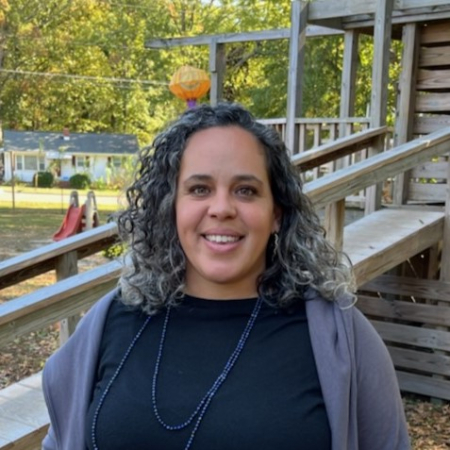SPOTLIGHT: Megan McCurley, Executive Director, the Latino Educational Achievement Partnership (LEAP), Durham, NC
<<< Back to July 2024 Newsletter
 |
MEGAN McCURLEY Megan McCurley serves as the Executive Director of the Latino Educational Achievement Partnership (LEAP), a Durham-based dual language immersion program for 3- and 4-year-olds. Under Megan’s leadership, LEAP empowers children in Durham to achieve academic success by providing a high-quality, dual-language preschool and ongoing support throughout middle school. The program offers intentional teaching with a strong language focus that challenges children cognitively, emphasizes social-emotional development to strengthen confidence, and builds community in the classroom. Megan holds a BS in Childhood Education and an MA in Anthropology and Education, and brings both non-profit leadership and organizing experience as well as a deep commitment to supporting Latinx families in Durham. LEAP is an employer under Durham NC Pre-K’s sponsored apprenticeship program, the largest sponsored apprenticeship program in NC. |
Tell us about your career in education and how you came to LEAP.
I moved to North Carolina in 2008, after growing up in New York. I have worked at Duke and UNC Chapel-Hill, where I was the Executive Director of the Student Coalition for Action in Literacy Education and as an Adjunct Instructor. I helped build the Bull City Community Schools Partnership as one of the first Community School Coordinators in Durham Public Schools. My partner and I have two wonderful children who are both LEAP alums, and I saw first-hand the impact of this program.
Can you briefly discuss how the apprenticeship program has supported LEAP?
The apprenticeship program has had a huge impact on LEAP. First and foremost, it gave us a path to be able to support our staff to gain valuable training and to obtain credentials that not only support their professional growth, but also improve the overall quality of our program. As a school that must hire bilingual educators for our dual language model to work and to serve our primarily Spanish speaking community well, we have a much more limited pool of educators to recruit from in a field that is already struggling to recruit qualified educators. The financial support we receive also allows us to pay our teachers a living wage, which is very difficult to do while fundraising, to be able to offer our program at an affordable rate for low-income families. In addition, the financial support is provided in a timely manner that allows us to operate.
The apprenticeship program has helped us to recruit and retain excellent teachers because it serves as a valuable benefit for candidates who want to make a career out of teaching. We know that some of our educators may leave us when they finish the program. We see ourselves as an important part of an early childhood education ecosystem that can bring more Latino educators into the field and provide critical training in a multilingual environment that prioritizes culturally affirming practices and equitable access. If educators leave our part-time program, they will take those lessons with them to other Pre-K programs and improve accessibility in new places.
How has Building Bright Futures enabled you to support your early childhood apprentices?
Beyond living wages and substantial professional development, BBF has allowed us to connect our apprentices to a broader network within ECE spaces. Presenting at events such as the 2024 National Smart Start Conference and the NCBCE All-Member Luncheon builds our apprentices’ leadership and advocacy skills. It shows them that they can have a voice to build the early childhood field, one that is so important to a young child’s development. A staff person at LEAP recently left our school to pursue a job with the public schools because in her over 20-year career in early childhood, she has never had a job with benefits. Programs like BBF are helping us elevate the field and really showcase the skills, professionalism, and leadership potential in our educators. These efforts will help us to advocate for the funding and resources we need to provide educators with the compensation they deserve.
With staffing challenges in child care, have you found that there is any increased or decreased interest in ECE?
I believe we will always have an interest in early childhood education and growing our own Latino educators. Going to school and working at the same time is a challenge for our apprentices, especially when they are first getting started. At LEAP, we want to support them in all ways and having a strong connection with school and work makes balancing school and work easier. It makes a difference when someone learning new skills can apply that learning directly in the classroom. Having an apprentice learn and work together with other staff is so important.
What do you think is the strongest piece of the early childhood apprenticeship program?
The apprenticeship program helps to grow the early childhood workforce with financial support and professional development. Bilingual teachers make a big difference in children’s lives by honoring their native languages, culture, and traditions. Having a growing, diverse state with bilingual early childhood educators allows us to take full advantage of this diversity.
If money were no object, what change(s) would you make to your program?
If money were no object, I would renovate our facility to expand it for licensing and for reaching more children and families. I would ensure that teachers received wages that reflected the important work they perform. This growth would allow me to hire more staff and add additional apprentices.
What do you want others to know about the importance of ECE as it relates to building the workforce?
I am so fortunate to lead a Latinx organization where the staff and the community we serve are collectively committed to creating a space where our bilingualism is honored, where families can build their skills and leadership as advocates, and where Latinx children and families can thrive.